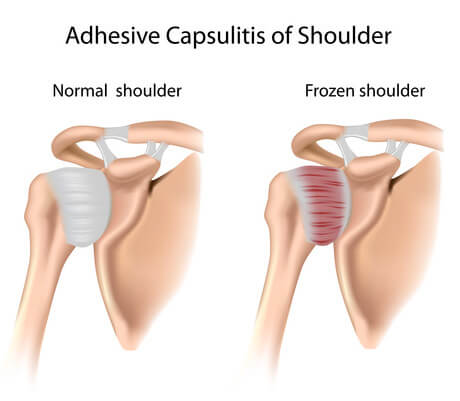What is a frozen shoulder?
Frozen shoulder, also known as adhesive capsulitis, is a condition that causes pain and limits the range of movement in the shoulder joint. The symptoms of frozen shoulder typically start mild, and worsen over time until the range of motion is limited so severely it feels “frozen”. Roughly 2-5% of the general population will experience frozen shoulder.
What are the symptoms of a frozen shoulder?
Frozen shoulder typically follows three different phases, which have different symptoms and severity:
- Acute “freezing” phase: Shoulder movement causes pain, particularly large movements, which increases over time. Range of motion in the shoulder gradually decreases.
- Adhesive “frozen” phase: Pain starts to lessen, while range of motion further decreases.
Long-term “thawing” phase: Over time, the range of motion will return to normal
Can I prevent frozen shoulder?
If you think you are at risk of frozen shoulder due to pre-disposing risk factors, the best thing you can do is try to prevent it. In particular, if you are recovering from a shoulder injury or surgery and have limited mobility in your shoulder, our physiotherapists can design a shoulder exercise plan to help prevent frozen shoulder from developing.
Should I see my physio for frozen shoulder?
Frozen shoulder is typically a self-limiting condition, meaning that it will eventually resolve on its own; however, this usually takes between two to three years. Your physiotherapist can help design a treatment plan for you that will help resolve the problem much sooner.
Self-diagnosing the cause of shoulder pain can be risky. Some physical therapy exercises for other causes of shoulder pain can be harmful to patients with frozen shoulder and can slow your recovery time. If you have been experiencing shoulder pain with limited movement, it is important to see your physiotherapist so an accurate diagnosis can be made.
What are the causes of frozen shoulder?
Frozen shoulder occurs when the connective tissue in the shoulder joint thickens and tightens, limiting movement. We don’t currently know what causes this to happen, but risk factors include:
- Diabetes
- People over 40
- Female gender
- Long-term immobility of the shoulder joint, e.g. due to a broken arm, or recovery from surgery or stroke
If you would like to learn more about shoulder physiotherapy, & treatment for shoulder physiotherapy then please view these links. If you would like more information please give us a call or make an appointment to check your shoulder.

